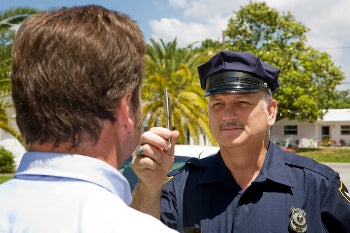
Police use field sobriety tests to determine whether a person is driving under the influence (DUI) of drugs or alcohol. Poor performance on a field sobriety test is considered an indication of impairment that may be probable cause for arrest. California police rely heavily on field sobriety tests in determining whether to detain someone for DUI. However, even in optimal conditions, sober drivers may fail field sobriety tests and appear intoxicated.
If you face DUI charges in California because of a failed field sobriety test, contact Santa Barbara DUI lawyers at the Aron Law Firm. We understand that field sobriety tests may lead to unjust arrests. That’s why we’re committed to standing up for our clients’ rights and freedoms. Contact us to schedule a confidential consultation to discuss your situation today.
What DUI Field Sobriety Tests Do California Police Use?
Field sobriety tests are a series of physical and mental exercises that act as an objective standard for measuring a person’s blood alcohol content (BAC).
California police use three standardized field sobriety tests:
- Horizontal gaze nystagmus
- Walk and turn
- One-leg stand
These field sobriety tests together are 91% accurate, according to the National Highway Traffic Safety Administration (NHTSA). In other words, these tests deliver incorrect results about 9% of the time. Below are further details regarding each DUI field sobriety test used in California.
How Does the Horizontal Gaze Nystagmus Test Work?
The horizontal gaze nystagmus (HGN) test examines the involuntary twitching eye movement when the eyeball extends to the farthest peripheral. Generally, this jerking eye movement only happens when you look to one side. A person with a high BAC, however, may experience this eye movement all along their gaze. A police officer administers the HGN test by gradually moving a pen or flashlight back and forth in front of a person’s eyes.
Police look for three signs of impairment during the test:
- Do the person’s eyes smoothly track the object?
- Does the eye start to jerk when looking to the side?
- Does the eye start to jerk before reaching 45 degrees off the center?
If an officer finds that the driver performed poorly on this test, they may arrest the driver for DUI. However, intoxication isn’t the only cause for a person’s eye to jerk involuntarily. That may also be an effect of wearing contact lenses, taking certain medications, and fatigue.
What Are Divided Attention Field Sobriety Tests?
The walk and turn and the one-leg stand are regarded as “divided attention” sobriety tests that police use in California. While administering the test, the police ask the driver to complete an easy task while listening to instructions. For someone sober, these tasks are generally easy to accomplish. A person with a high BAC, however, may experience trouble executing them successfully.
The Walk and Turn Test
Like the one-leg stand, the walk and turn includes an easy task with a set of instructions. During the walk and turn test, police officers may ask a suspected drunk driver to walk nine steps.
To start, the officer instructs the subject to place their left foot flat on the ground with their right foot directly in front, so the right heel touches the left toes. The driver is then asked to walk nine steps in that same heel-to-toe manner, turn around, and walk nine steps back to the starting point. The driver must do this while counting each step out loud.
During this test, police watch for the following clues of inebriation:
- Inability to balance
- Taking steps too soon
- Pausing in the middle of the test
- Taking an incorrect number of steps
- Failing to walk in a straight line
- Extending arms out to balance
- Turning incorrectly
The One-Leg Stand Test
During the one-leg stand test, a police officer may tell the driver to stand feet together, then lift one leg about six inches off the ground. While they are standing on foot, the officer asks the subject to start counting out loud until told to stop.
Throughout this test, police watch for the following signs of impairment:
- Rocking back and forth
- Balancing with arms extended
- Bouncing to keep balance
- Placing a foot on the ground to support balance
If the driver displays two or more of these indications, they may be arrested for drunk driving.
Can I Refuse to Take a Field Sobriety Test?
Yes, you may refuse to take a field sobriety test in California. Despite popular belief, these tests are not mandatory, and you are not legally required to take one during a DUI traffic stop; however, refusing to do so may not necessarily improve your situation or help you avoid a DUI arrest.
The goal of field sobriety tests is to provide law enforcement with as much proof as possible to warrant your arrest. If you’re pulled over for DUI but are not arrested, your refusal to submit to field sobriety tests may establish probable cause for the officer to arrest you.
Speak with Skilled Santa Barbara DUI Lawyers after a Failed Field Sobriety Test
If California police arrested you for drunk or drugged driving after you failed a field sobriety test, you need experienced legal help on your side. Some situations deem the results of field sobriety tests inadmissible in court, and an experienced DUI defense attorney may help you determine this.
Trust the Santa Barbara DUI lawyers with the Aron Law Firm to defend your rights and protect your freedom. Led by former California Deputy District Attorney William Aron, our team of DUI defense lawyers is here to help you develop a thoughtful and effective strategy that may prove your innocence in court. After a DUI arrest in California, contact the Aron Law Firm and speak with an accomplished DUI defense attorney about your situation. Schedule a confidential consultation today by completing a contact form or calling 805-500-7745.

